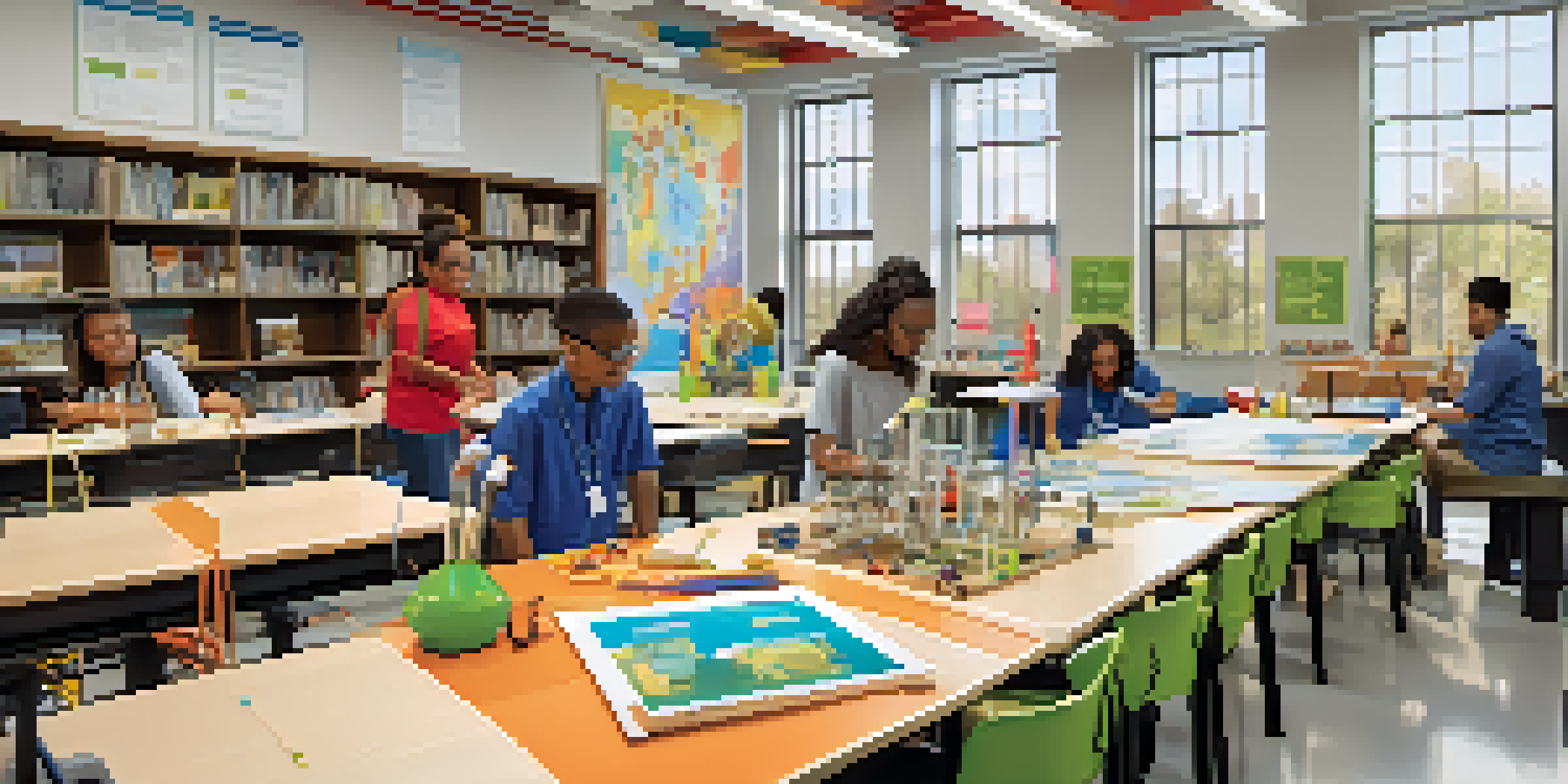STEM Education Initiatives in Houston's Higher Learning Institutions

Houston's Growing Focus on STEM Education
Houston has positioned itself as a major hub for STEM education, driven by its diverse economy and technological advancements. Local colleges are increasingly recognizing the importance of equipping students with science, technology, engineering, and mathematics skills. This focus not only caters to the demand for skilled professionals in these fields but also enhances the city's reputation for innovation.
Education is the most powerful weapon which you can use to change the world.
Institutions like the University of Houston and Rice University have dedicated programs that foster STEM learning and research. These programs aim to provide students with hands-on experiences and opportunities to engage with real-world challenges. By cultivating a strong foundational understanding of STEM principles, Houston's higher learning institutions are preparing students for future careers in high-demand fields.
Moreover, collaborations between universities and local industries are becoming more common, allowing students to gain practical insights into their chosen fields. This synergy helps create a workforce that is not only knowledgeable but also adaptable to the ever-evolving technological landscape.
Key STEM Programs at Local Universities
Several universities in Houston have established prominent STEM programs that are attracting students from all over the country. For instance, the University of Houston boasts a comprehensive College of Natural Sciences and Mathematics that offers a range of degrees in fields like biology, physics, and computer science. This breadth ensures that students can find a path that aligns with their interests and career goals.

Rice University, known for its rigorous academic standards, offers robust STEM initiatives including research opportunities and specialized courses. Their commitment to interdisciplinary learning encourages students to explore connections between different fields, further enhancing their educational experience. This approach not only broadens their knowledge base but also fosters critical thinking skills.
Houston's STEM Education Hub
Houston is emerging as a major center for STEM education, driven by local universities' commitment to equipping students with essential skills.
Additionally, institutions like Texas Southern University are making strides in increasing access to STEM education for underrepresented groups. Programs aimed at supporting minority students in STEM fields are vital for creating a diverse and inclusive workforce that reflects the community's demographics.
Partnerships Between Industry and Academia
One of the most effective ways that Houston's colleges are enhancing STEM education is through strategic partnerships with local industries. These collaborations provide students with invaluable internship and mentorship opportunities. By working closely with professionals in the field, students gain practical skills that are often not covered in traditional classroom settings.
The future belongs to those who believe in the beauty of their dreams.
For example, partnerships with tech companies allow students to engage in real-world projects that can bolster their resumes. These experiences not only prepare students for the job market but also help them develop a network of contacts that can be beneficial in their careers. It's a win-win situation where both students and companies benefit from shared knowledge and resources.
Moreover, these partnerships often lead to funding for research projects and initiatives that further enhance STEM curriculum offerings. By aligning educational programs with industry needs, institutions can ensure that their graduates are well-prepared to meet the demands of the modern workforce.
Community Outreach and STEM Education
In addition to academic initiatives, many Houston colleges are actively involved in community outreach to promote STEM education among younger students. Programs aimed at K-12 students often include workshops, summer camps, and mentorship opportunities that spark interest in science and technology. This early exposure can significantly influence a student's decision to pursue a STEM career later on.
Organizations like the Houston Museum of Natural Science collaborate with local universities to host events that make STEM learning fun and engaging. By providing hands-on experiences and interactive exhibits, these initiatives help demystify complex scientific concepts for younger audiences. Such exposure can ignite a passion for STEM subjects that lasts a lifetime.
Industry-Academic Collaborations
Strategic partnerships between universities and local industries provide students with practical experiences and enhance their job readiness.
Furthermore, these outreach efforts contribute to building a more educated community. By fostering an interest in STEM from a young age, Houston's colleges are helping to create a future workforce that is better equipped to handle the challenges of tomorrow.
Funding and Resources for STEM Initiatives
Funding plays a crucial role in the success of STEM education initiatives across Houston's higher learning institutions. Many universities are actively seeking grants and sponsorships to enhance their STEM programs. This financial support is essential for developing cutting-edge laboratories, acquiring new technology, and providing scholarships for students pursuing STEM degrees.
In addition to external funding, universities are also reallocating their budgets to prioritize STEM education. This strategic approach ensures that resources are available to create innovative curricula and offer competitive research opportunities. By investing in these areas, institutions are signaling their commitment to preparing students for careers in rapidly growing fields.
Moreover, state and federal initiatives aimed at improving STEM education funding are also making a significant impact. Programs that provide financial support for research, scholarships, and infrastructure development help ensure that students have access to the tools they need to succeed.
The Role of Faculty in STEM Education
Faculty members play a pivotal role in shaping the STEM education landscape at Houston's colleges. Their expertise and passion for their subjects inspire students to delve deeper into scientific inquiry and innovation. By fostering an engaging learning environment, professors encourage students to think critically and creatively about complex problems.
In many institutions, faculty members are also involved in research projects that provide students with unique educational experiences. This hands-on involvement allows students to learn from experts in the field while contributing to advancements in technology and science. Such mentorship is invaluable, often guiding students toward successful careers.
Focus on Diversity in STEM
Houston's initiatives to promote STEM education among underrepresented groups aim to create a diverse and inclusive workforce.
Additionally, faculty collaboration across disciplines enhances the educational experience. By working together, professors can create interdisciplinary courses that expose students to various perspectives and methodologies, enriching their understanding of STEM fields.
Future Prospects for STEM Education in Houston
Looking ahead, the future of STEM education in Houston appears bright, with continued investment and innovation on the horizon. As technology evolves, educational institutions are adapting their curricula to incorporate emerging trends and technologies. This proactive approach ensures that students are well-equipped for the careers of tomorrow.
Moreover, Houston's commitment to diversity and inclusion in STEM education is likely to strengthen its workforce. By providing opportunities for underrepresented groups, the city is fostering a rich tapestry of ideas and perspectives that can drive innovation. A diverse workforce is essential for addressing complex global challenges.

Finally, as collaborations between academia and industry grow stronger, the alignment of educational outcomes with workforce needs will become increasingly seamless. This synergy will not only benefit students but also help maintain Houston's reputation as a leader in technology and innovation for years to come.